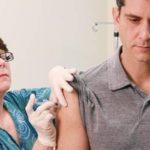1. In this retrospective cohort study among prison residents and staff, mRNA vaccination and previous exposure provided more protection against the coronavirus disease 2019 (COVID-19) omicron variant compared to either alone.
2. Three vaccination doses were more effective than two doses for omicron protection.
Evidence Rating Level: 2 (Good)
Study Rundown: COVID-19 Omicron variant protection can be acquired through previous infections and vaccination. There is limited information on the level of protection by additional vaccine boosters and the timing of previous infections. Prison systems are prone to COVID-19 outbreaks due to their high-risk congregate setting. This retrospective cohort study evaluated the effectiveness of mRNA vaccination and timing of previous COVID-19 infections for protection against polymerase chain reaction (PCR)-confirmed omicron infection. The study was conducted at 35 prisons in the California Department of Corrections and Rehabilitation (CDCR) system between December 24, 2021 to April 14, 2022. For both residents and staff, two to three doses of mRNA vaccination reduced the incidence of omicron infection in those with and without previous infection. For those without vaccination, previous COVID-19 infection before or after delta predominance also conferred protection against omicron infection. There was also a lower incidence of omicron infection among individuals who received the third dose of vaccine compared to only two doses. As a limitation, COVID-19 testing for residents was not routine or compulsory, which may lead to inaccurate estimates of incidence. Additionally, the study was unable to evaluate the effectiveness of vaccination and previous infection for the incidence of COVID-19 symptoms, hospitalizations, or death due to limited data and small sample size.
Click to read the study in NEJM
In-Depth [retrospective cohort]: In the present retrospective cohort study, the effectiveness of mRNA vaccination and previous COVID-19 infection for protection against PCR-confirmed omicron infection was evaluated in residents (n=59,794) and staff (n=16,572) at 35 prisons in the CDCR system between December 24, 2021 and April 22, 2022. Nearly half of the residents and one-third of the staff had previously confirmed infections. For residents, vaccination significantly reduced the incidence of COVID-19 infection during the period of omicron predominance in those without previous infections (for three doses, 40.9%; 95% Confidence Interval [CI] 31.9 to 48.7). Three vaccinations for residents who were infected with COVID-19 before (57.7%; 95% CI, 50.8 to 63.6) and during delta predominance (84.6%; 95% CI, 70.7 to 91.9) also reduced the incidence of infection during the study period. Without vaccination, infection during (38.3%; 95% CI, 6.5 to 59.3) the period of delta predominance conferred higher effectiveness against infection than that before the period of delta predominance (27.5%; 95% CI, 14.8 to 38.4). Compared with two vaccination doses, the third dose had an estimated effectiveness of 27.4% (95% CI, 19.9 to 34.2) and 13.3% (95% CI, 3.2 to 22.3) for those who did not have a previous infection and those who had a previous infection before the period of delta predominance respectively. The effectiveness of the third dose was not significant for those who were infected during the period of delta predominance. Similar effectiveness of vaccination and previous infection against COVID-19 infection was observed for staff. This study shows that combined immunity from vaccinations and previous infections provide substantial additional effectiveness for protection against COVID-19 infections.
Image: PD
©2022 2 Minute Medicine, Inc. All rights reserved. No works may be reproduced without expressed written consent from 2 Minute Medicine, Inc. Inquire about licensing here. No article should be construed as medical advice and is not intended as such by the authors or by 2 Minute Medicine, Inc.


